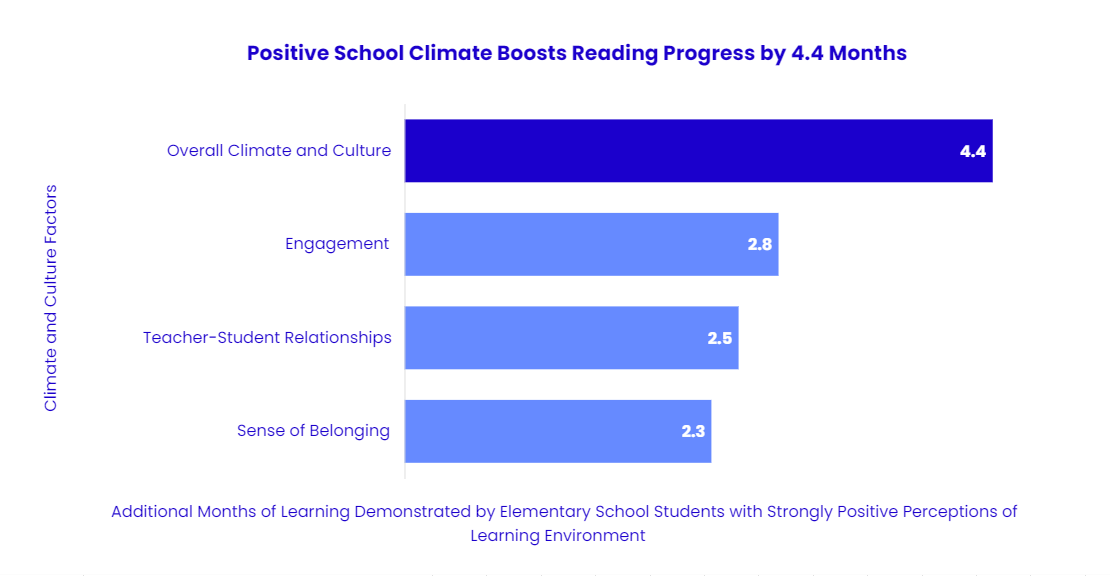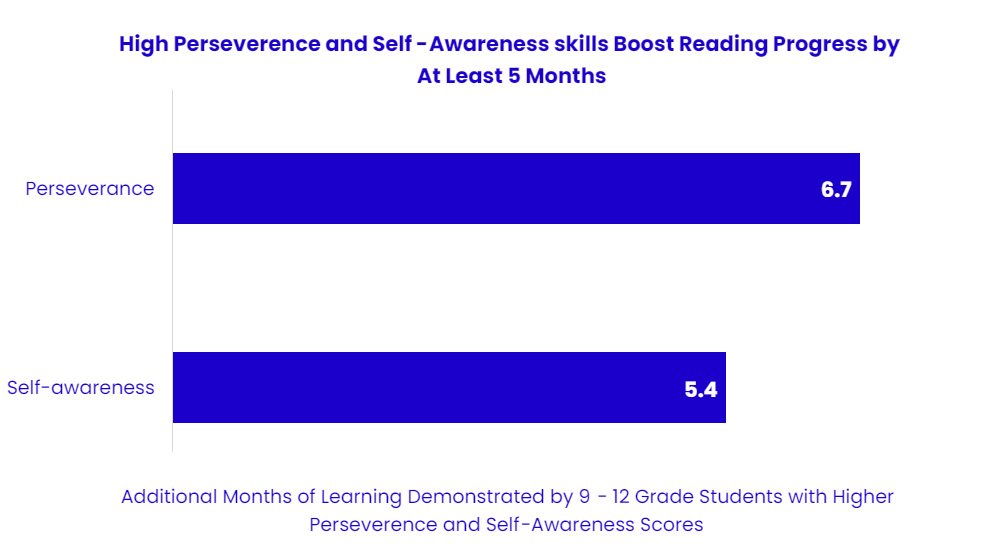By Jason Atwood, Director, Research and Learning
Even as the shadows of the pandemic recede and schools invest heavily in recovery efforts, students across the country continue to navigate an array of obstacles. Supporting their academic, social, and emotional development remains paramount. At NewSchools, we invest in the design of new schools with joyful learning environments where students are supported to realize their full potential. Our expanded definition of student success framework helps us identify the specific factors that enable young people to pursue lives full of choice and meaning.
Our latest analysis of student data from our national portfolio of more than 120 public schools reaffirms what we’ve known all along: prioritizing essential mindsets, habits, and skills and strong school culture motivates students and leads to remarkable academic gains. These schools will serve more than 76,000 students across 31 states at full enrollment. Before the pandemic, our students gained the equivalent of approximately 91 extra days of learning within a typical school year. Recently, schools in our portfolio have made significant academic progress by implementing a combination of practices like cultivating a growth mindset in students, ensuring their physical and emotional safety, and fostering high expectations among teachers. And we are proud that students of color across our portfolio report a higher sense of belonging than peers in traditional educational settings — by an 11-point margin.
We are continually analyzing our student survey and academic assessment data to determine which specific mindsets, habits, skills and school culture factors drive academic results. In this blog, we highlight three important insights that emerged from our analysis of over 32,000 student surveys and 20,000 NWEA MAP Growth assessments administered at our schools from the 2022-23 school year. Combined with our previous findings, these insights reinforce a fundamental truth: students thrive best when they feel valued, secure, and connected to their school.
1. Student Connection in Elementary School Drives Success
Fourth and fifth grade students who establish strong bonds with their teachers, actively participate in classroom activities, and feel supported and accepted by both adults and peers, experience more than double the amount of reading growth compared to their peers in environments with low ratings of school culture and climate. These gains translate to more than four additional months of literacy instruction.

Additionally, fourth grade students who develop friendships across racial and cultural lines and perceive their school as affirming diverse identities exhibit 20% greater gains in math and 60% greater gains in reading compared to their peers with lower equity and inclusion ratings.

Implications for Educators
Create an inclusive and supportive culture by developing meaningful teacher-student relationships, encouraging students to actively participate in the classroom and share their experiences, implementing inclusive curricula, and training teachers in culturally responsive practices.
2. Safety Is Paramount, Especially in Middle School
Middle school students who feel safe and secure at school, free from worries about violence or bullying, achieve more significant gains in math than their peers who feel insecure or unsafe. The difference in outcomes is substantial, equivalent to over 2.5 months of additional math instruction.

Implications for Educators
Investing in robust anti-bullying policies, establishing effective communication channels for reporting concerns, and training staff to respond to safety threats promptly are crucial. Creating a culture where every student feels seen, heard, and supported can mitigate feelings of insecurity and promote a sense of belonging. By prioritizing the physical and emotional safety of students, middle schools can enhance students’ overall wellbeing and readiness to learn.
3. 9th-Grade Engagement Is a Valuable On-Track Indicator
High school freshmen who demonstrate strong enthusiasm for learning and active participation in the classroom achieve three times the gains in math and reading compared to their peers with low engagement scores. Students with the highest engagement scores also surpassed national academic growth norms.

More broadly, 9th through 12th graders with strong self-awareness and perseverance skills achieve significant gains in reading, akin to six additional months of schooling.

Implications for Educators
It has become a more common practice for high schools to monitor freshman on-track indicators, such as attendance rates, credits earned, and course pass rates. Our research suggests the value in focusing on 9th grade engagement scores as measured by a simple and effective 4-item student survey.
The way students respond to these items are leading indicators of their academic performance; regular pulse surveys to track student enthusiasm, interest, participation, and focus in the classroom can reveal opportunities to provide additional supports and services that will accelerate math and reading outcomes. To promote self-awareness and perseverance skills throughout high school, educators can integrate exercises into their instructional practices that help students engage in self-reflection, goal-setting, and build resilience.
Our latest insights shed light on crucial skills essential for academic success, underscoring the need for schools to support students in developing them. From nurturing strong teacher-student bonds in elementary grades to ensuring safety in middle school, and fostering engagement in high school, each insight offers actionable areas of focus for educators. By prioritizing essential habits, mindsets and skills, and strong positive learning culture, alongside academic excellence, we can empower students to thrive holistically. As we do this vital work, it’s imperative that schools embrace metrics capable of capturing the entirety of student growth and experiences, advancing a more human-centered vision of education where every student feels motivated and supported to learn.

Jason Atwood
Jason is the Director of Research & Learning at NewSchools, leading a team dedicated to evaluating the effectiveness of education programs, initiatives, and investment strategies. He and his team work closely with funders, educators, and a network of partners to measure portfolio performance and generate insights about how to support and scale high-impact educational innovations.
